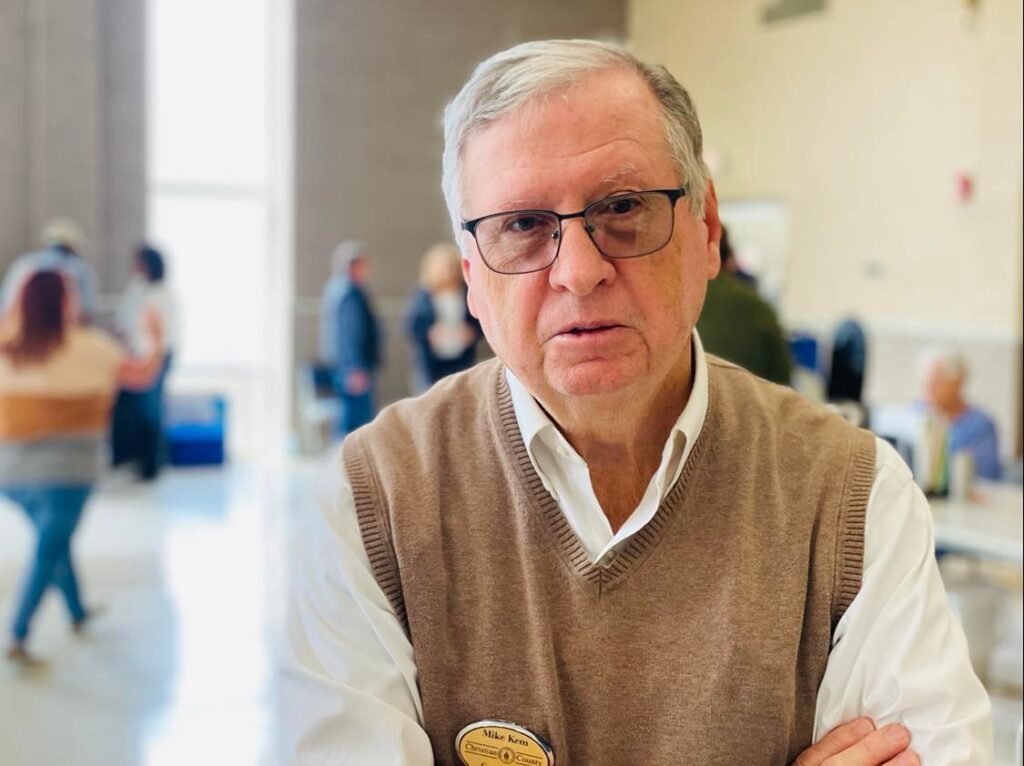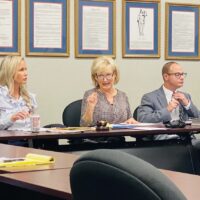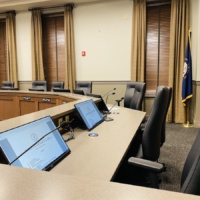When Mike Kem retires at the end of the year, he’ll have served as Christian County’s clerk for 24 years. Some of his younger constituents might not know what Kem faced when he first took office — but I am old enough to remember that era in county government, and for that reason, I thought it was appropriate to take some time on Election Day to talk with him about his career in public service.
And as I told one of his employees at the courthouse that morning as I tried to pin down where I would find him, I felt like someone ought to take a photo of Kem at a polling place on the occasion of the last election he would oversee. It seemed like a moment in local history worth documenting because I knew Kem would never draw that kind of attention to himself.

It is an understatement to say that Kem is not the kind of man who looks for opportunities to have his photo taken. You might say he fits quite nicely in the stereotype of an accountant. But to his credit, he indulged my request and let me shoot a few photos of him when he stopped by the Christian County Senior Center’s polling place on Election Day. He had just come back into town after driving to Crofton to check on a printer that malfunctioned at another voting center. He stopped at the senior center because one of three ballot scanners at that location wasn’t working.
Following his election as county clerk in the late ’90s, Kem inherited an office that had been managed temporarily by Dudley Lacy, who was an interim county clerk. Lacy, a county magistrate, had been tapped for the job after Elwanda Kennedy left office early in the wake of a criminal investigation. She was charged with felony theft and made restitution of $35,000 after prosecutors said she failed to turn over some receipts in her office. She entered an Alford plea, which meant she maintained her innocence but conceded the commonwealth had enough evidence for a conviction.
In addition to running elections, a county clerk oversees the office that handles real estate deeds and records, vehicle and boat registrations, and marriage licenses.
Kem owned an accounting firm and was starting his second term as a county magistrate when he was elected county clerk. He said the courthouse offices had only a handful of computers, and employees were still using muffin tins to hold coins in cash drawers.
In addition to modernizing the office, he set out to change the culture of the workplace so that employees treated people who had business in the courthouse more like customers. That was a shift that I personally witnessed and can state did happen.
“I was shocked to see how backward the office was,” he told me as he recalled the muffin tins for coins.
I remember many of those details myself because I was reporting on the clerk’s office for the New Era during the time Kennedy was indicted.
But I was surprised by other details of Kem’s life in politics that I’d not heard before I interviewed him on Election Day.
Kem, a Democrat, described the day he registered to vote in high school.
“I’ll never forget the day [then-clerk] Tommy Morris registered the seniors. … He said, ‘What do you want to be, a Democrat or a Republican?’
Kem asked how most people registered. When Morris responded that almost everyone in Christian County at that time was a Democrat, Kem responded, “Well, I’ll be a Republican.”
Within a year, Kem was a student at Hopkinsville Community College and was elected president of the Young Democrats. A party switch was already in the works because he was supporting Hopkinsville Democrat Katherine Peden in her run for U.S. Senate. She won her primary but lost in the 1968 general election to Republican Marlow Cook, of Louisville.
In 1972 Kem earned a bachelor’s degree in business administration from the University of Kentucky. It was difficult to find work right out of college, so he took a job as a social worker for 10 months and then found a position in management with J.C. Penney in Frankfort.
Kem felt like he understood the company’s inventory system better than his boss. In fact, he was pretty sure his boss was cheating the company — and told him so.
“You don’t tell your boss he’s cheating,” Kem told me, laughing.
After that misstep, he was talking with a bookkeeper at the company who told him, “You need to be an accountant.”
She was correct, Kem thought, and he went back to UK. He earned his accounting degree in 1978 and returned to Hopkinsville to work for Thurman and Campbell, an accounting firm. He later established his own firm.
During his time as a county magistrate, Kem was instrumental in writing a plan for a paramedic ambulance service for the city and county. Previously, only emergency medical technicians staffed the ambulances. In addition to upgrading the level of care ambulance crews could provide, the service was able to bill Medicare and Medicaid at higher rates, Kem said.
Now that he’s retiring, Kem said his first priority will be spending more time with family. Kem and his wife, Vivian, a retired teacher, have five grandchildren in Hopkinsville. The oldest is 17.
“I’m ready to go,” he said, conceding that the office he holds has been more stressful for the past few years. On the heels of the coronavirus pandemic, there has been much more public scrutiny of how elections are run.
Kem’s successor will be Melinda Humphries. A Republican, she has worked for Kem as the county elections coordinator for 20 years.
“It’s been a good run. I’ve enjoyed most of it,” he said.
Jennifer P. Brown is co-founder, publisher and editor of Hoptown Chronicle. You can reach her at editor@hoptownchronicle.org. She spent 30 years as a reporter and editor at the Kentucky New Era. She is a co-chair of the national advisory board to the Institute for Rural Journalism and Community Issues, governing board president for the Kentucky Historical Society, and co-founder of the Kentucky Open Government Coalition.





